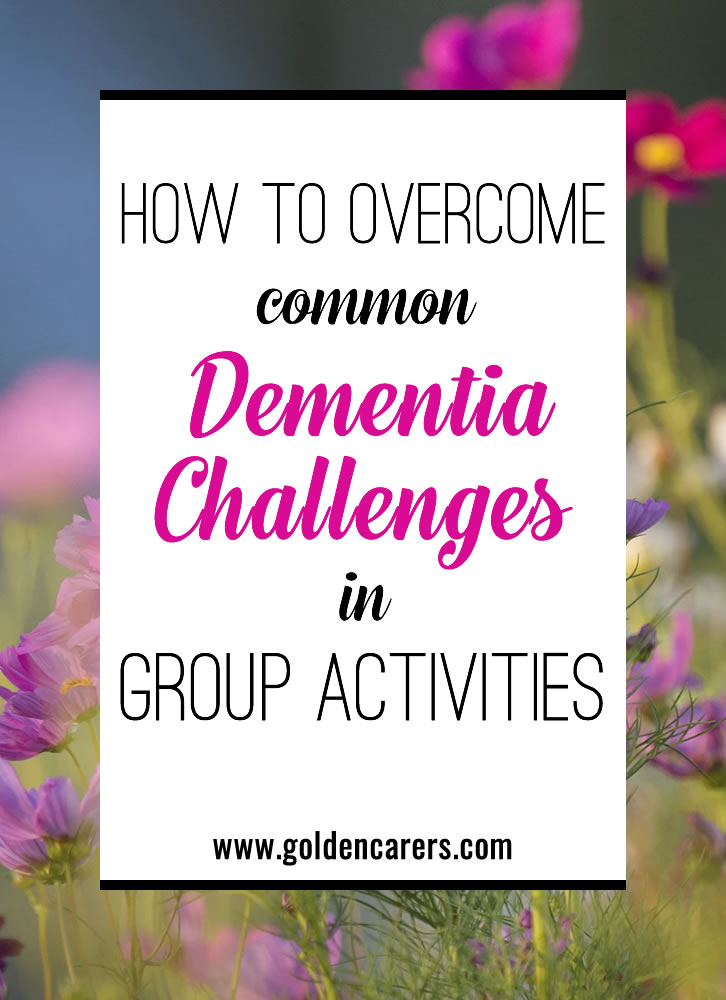
How to Overcome Common Dementia Challenges in Group Activities
By Haley Burress United States
Found In: ›Activities ›Articles ›Alzheimer's & Dementia

Golden Carers has 1000s of activities and resources for senior care.
Cognitive decline is a normal part of aging. Even if you do not work in a memory care community, you may need to use interventions to combat common activity challenges that come with cognitive decline.
Cognitive Challenges Caused by Dementia
Cognitive decline caused by Alzheimer’s disease or another type of dementia leads to confusion, impaired judgment and difficulties in communicating effectively. This means that the person living with cognitive decline can have difficulties following conversations, keeping up with instructions, or being able to understand their environment.
Of course, all of this can lead to “behaviors”, although I don’t like using that word. Residents who have challenges are often trying to communicate with us the best way they know how and sometimes that means they end up wandering, hitting, or crying out.
It can be difficult to run a successful activity when there are disruptions from residents living with dementia. Here are a few common challenges and ideas on how to meet those challenges with dignity and respect for all the residents you serve.
How to Overcome Common Dementia Challenges
All residents are unique, and it is important to remember that not all of these interventions will work in every situation and with every resident. However, with all dementia interventions, it is best practice to have a bunch of ideas on your dementia toolbelt so that you can discover which approaches work best for each person and situation.
Wandering in and out of activities
First, evaluate if the wandering is really a problem during the activity. For example, a resident wandering in and out of a busy social activity may not be a major disruption in all the festivities. However, if a resident is wandering in and out of a presentation and disrupting the speaker or audience, you might deem it an issue.
If you have a resident who is a regular wanderer, you can look for them and offer to walk beside them arm-in-arm, keeping them to the back of the room to minimize disruption.
Not understanding instructions, asking repetitive questions
You can help a resident who has trouble with instructions with any of these interventions:
- Have a volunteer sit next to them to walk them through the task step-by-step
- Write down instructions and put the paper near them so you can redirect them to it when needed
- Pair them with a helpful resident who can direct them to the next step
- Have them stand with you as your volunteer assistant to lead the group through the activity; they can follow instructions with your assistance one step at a time
Being verbally or physically aggressive during an activity
Everyone can get cranky sometimes, but those without cognitive decline have a decreased capacity to handle situations with grace and patience. If you have a resident who can get verbally or physically aggressive during activities, here are interventions you can try:
- Work with your social work department to track behaviors and offer insight
- Sometimes aggression is fueled by overstimulation; give the resident a more calm place to sit during the activity. For example, perhaps have them sit away from the audio speaker or in a small group of 2 instead of 6
Other residents being mean to the resident with cognitive decline
Sometimes, the challenges you must meet as an Activity Professional regarding dementia are not from the person living with dementia at all. Residents without cognitive decline can lose their patience and can say insensitive things to their peers. If this happens, it can be uncomfortable to “correct” the resident, but it is imperative as you maintain the dignity of the resident with dementia. Here’s how you can handle it:
- Take the resident aside to talk about it
- Don’t scold the person, instead explain that harsh words are not acceptable
- Work with social work as needed if the problem persists
5 Truths About Working with Adults with Dementia
When working with adults with dementia, it can help if you have certain truths that you hold tight and share with your team. Here are a few of my favorites:
1. It’s never about the finished product, it’s about the experience. If a resident doesn’t complete their craft project correctly, it doesn’t matter. It’s about the experience of creating the craft project and socializing with others that really matters.
2. Look around to see what the person might be trying to tell you. Remember, many challenges come with the person trying to communicate. Is it too loud where they are sitting? Is the sunlight shining in their eyes from the window? Do they need to use the restroom? Try to discover what they are trying to tell you with their actions.
3. Everyone deserves to participate in activities.It’s our role to find a way for everyone to feel included and to feel successful during any activity. No one should be turned away because of their specific challenges.
4. Your interventions matter because they show other staff members how activities are therapeutic. Many times in my career, it’s been an activity intervention that becomes the turning point for how an entire staff cares for a specific resident with a challenging behavior.
5. Get creative and keep trying something new.
Dementia is always progressing, which means we should be too. Remember that what worked yesterday might not work today and that is okay. Keep at it!
Let’s try to help each other in the comments. Share a specific situation you are struggling with regarding dementia and activities. We’ll see if we can crowdsource a few ideas for you. We’re all in this together to provide the best care for those we serve.
Related Activities
Comments Post a Comment
 20th Dec 2021
Senior Coordinator
20th Dec 2021
Senior Coordinator
Thank you for the insight.
Is there any online free course on Dementia?
I am very much interested in doing.
Please let me know.
Thank you.
Zeba
Seniors Program Coordinator
 21st Dec 2021
21st Dec 2021
https://www.utas.edu.au/wicking/understanding-dementia
 21st Jul 2021
Activities director
21st Jul 2021
Activities director

 23rd Jul 2021
Activity Director
23rd Jul 2021
Activity Director
I think this article may help you
It gives us many good ideas
Also read the comments
https://www.goldencarers.com/how-to-respond-to-challenging-behavior/3847/


 19th Jul 2021
Activity Director
19th Jul 2021
Activity Director
Thanks for sharing this and the good outcome you got


 17th Jul 2021
Activity Director
17th Jul 2021
Activity Director
Thank you for sharing this information
Another thing I did when the residents were being unkind is that I would have a kindness activity and will talk about what that means to be kind
They seem to help for a while anyway
https://www.goldencarers.com/comments/19368/
 16th Jul 2021
Activities Director
16th Jul 2021
Activities Director

 16th Jul 2021
Activity Director
16th Jul 2021
Activity Director
Yes this can be difficult if you are mixing all types of residents
Have you tried the suggestions in this article
I like Pairing the residents
Also what I did is to do a one to one interaction within the group
That way you can make what you are doing more appropriate to each person
I’d like to do a musical activity because that’s pretty inclusiveThese articles may help you also
https://www.goldencarers.com/8-ways-to-to-encourage-friendships-among-residents/6692/
https://www.goldencarers.com/laughing-together---five-activities-to-get-residents-smiling-/5430/
https://www.goldencarers.com/how-to-create-a-culture-of-happiness/5055/
 16th Jul 2021
Diversional Therapist
16th Jul 2021
Diversional Therapist
 17th Jul 2021
Activity Director
17th Jul 2021
Activity Director

 4th Jul 2021
HCA
4th Jul 2021
HCA
 18th May 2021
Lifestyle
18th May 2021
Lifestyle
 24th May 2021
24th May 2021


 23rd Apr 2021
Activity Director
23rd Apr 2021
Activity Director
I agree it’s not the finished product it is the experience or the process
Thank you
 23rd Apr 2021
Activities for Seniors
23rd Apr 2021
Activities for Seniors
 22nd Apr 2021
Music Therapist
22nd Apr 2021
Music Therapist

 20th Apr 2021
Recreation Therapist
20th Apr 2021
Recreation Therapist
You state to have instructions written down and placed near the resident as a source for them to return to gain directions to complete the task at hand
This method is ideal if the resident is still capable of reading

 Team Leadership: Discipline & Workplace Performance
Team Leadership: Discipline & Workplace Performance
 The Importance of Daily Living Activities for the Elderly
The Importance of Daily Living Activities for the Elderly
 How to Start a Photography Club for Seniors
How to Start a Photography Club for Seniors
 Life Reflections Posters to Connect with New Arrivals
Life Reflections Posters to Connect with New Arrivals


Do any of the organizations you are associated with have a hospice group because they often have a simple dementia courseThat they offer for free
The Alzheimer’s Association also has some for free
https://training.alz.org/